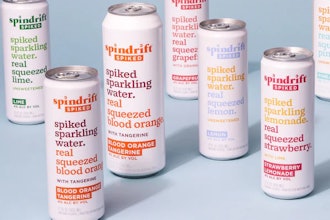
 Simon Negri
Simon Negri Corey Chafin
Corey Chafin Today’s consumers demand personalization across categories, products and experiences. From the clothes they wear, to vacation choices, and even to the medicine they take, consumers want unique, individual offerings tailored to their personalities, values, lifestyles, preferences and expectations.
Additionally, the shift toward health and wellness is undeniable. We understand the emphasis on health and wellness to be increasingly focused on nutrition rather than solely on exercise as the fundamental platform for living a long and healthy life.
Consumers are also becoming more equipped with data and tools to manage their own health — consumers buying into this approach are often fans of what some call the “Quantified Self” school of health and wellness. They believe that technology can and should be leveraged to provide a data-driven and complete picture of who we are and how we can optimize the performance of our bodies and minds through health regimens, exercise plans, diets, highly individuated medical care, and even — in the case of yoga and meditation — spirituality.
With all this is mind, we believe that in the near future, an average walk through a supermarket won’t involve checking smartphone apps for coupons or deals. Instead, customers will be busy scanning products to see how they align to their personal nutrition profile.
The philosophy behind personalized nutrition is simple. Because of our unique genetic makeup, we all digest and process the same foods differently. As a result, in order to deliver optimized benefits, diets and nutrition plans must be tailored to the individual.
Personalization in food is not a new concept. Differentiation in flavor and nutritional content has existed for years, yet this “one-size-fits-most” approach is likely to become obsolete as consumers demand personalization at the level of you and me.
So, it should come as no surprise that food manufacturers and retailers are jumping to capitalize on personalized nutrition and define the future of food and health.
Nutrition, it seems, is personalization’s next frontier.
Nutrigenomics: Putting the ‘Person’ in Personalization
Nutrigenomics, the study of the interaction of nutrition and genes, literally puts the “person” in nutrition personalization, extending the concept almost as far as it can go.
Fueled by the first mapping of the human genome in 2003, nutrigenomics has opened the doors to an entirely new industry of genetically-based products and services. The pace of genetic-based innovation is accelerating, from 23andMe, an offering which helps consumers understand their genotypic traits, to Habit, a startup offering personalized nutrition programs based on a person’s DNA. And, in the process, it’s starting to attract interest from more traditional and established companies. Last year, for example, Habit received $32 million in funding from the Campbell Soup Company.
Another example, Higi, allows consumers to regularly and easily measure basic metrics such as Body Mass Index (BMI). And of course, Fitbit wearables have become as common a wrist accessory as watches.
The Quantified Self market is awash with products — and rapidly expanding.
Connectivity is the critical link between consumers and personalized nutrition providers, and will be a critical tool for food engineers working to achieve targeted nutritional profiling through advancements in nutraceuticals and bio-fortified food manufacturing.
Fact and Fiction
So, how do consumers — or food companies for that matter — separate fact from hype and promising technologies from slick marketing campaigns? Let’s look at some facts.
We’ve been practicing crude personalization by producing food low in things we think are bad for us — like fat, sodium and sugar. Companies market the absence of certain ingredients such as glutens and GMOs as aggressively as they do the presence of certain qualities — for example, organic and cruelty-free products.
But reaching the level of specificity needed for true personalized nutrition would require foods specifically tailored to individual persons, rather than food formulated and "customized" for mass segments. While genetic measurement has improved, the linkage between genetics, nutrition and health are still a way off and yet to be fully vetted through clinical science. In the meantime, however, personalization can be implemented based on undisputed links between personal health profiles and nutrition.
Shoppers can’t — and won’t — be fooled. Consumers now have a better understanding of their own nutritional needs and personal genetic profiles, but still may not know how they translate to the food found on supermarket shelves. These uncertainties, and the ability to address them, are creating an opportunity for personalized nutrition, even in the absence of true genetic-based personalization. This is why pioneering companies like Campbell and Nestlé are moving so quickly into this area.
How Can Food Manufacturers Take Action?
The first step in capturing your fair share of the personalized nutrition market is determining where you want to play across the personalized nutrition value chain.
Though companies like Habit are seeking to be an end-to-end solution, opportunities exist for specialization in several specific components across the value chain. Do you want to develop nutritional additives, provide branding and packaging, or be a part of the consumer experience in-store? Decide where you want to plug-in and start there, while determining why and how personalization matters to your consumers.
Product personalization itself can occur at the farm, in the production plant or even in the consumer’s kitchen. Meal kits, for example, are positioned to offer personalization by providing consumers the tools and raw ingredients to design a meal tailored to their genetics based on a menu of options.
As with all new offerings, consider what makes your personalized offering different from the noise of new innovations that exists today. Evaluate the full customer journey, from the shopping experience to meal-times, digital engagement and even the achievement of desired health outcomes.
Finally, review current and potential partnerships in light of personalization potential. Test the waters for strategic collaboration and innovation. Start with your existing retail trading partners to bring forward new solutions or pursue direct to consumer channels.
And remember, there are clear risks associated with gathering and manipulating the data needed to make true personalized nutrition a reality, starting with consumer privacy concerns and extending to basic issues such as how to scale around true markets of one.
Today’s Adopters Will be Tomorrow’s Leaders
Each of us has a unique body, its appearance and function the result of a complex series of interactions between our individual genetic makeup, our diet and exercise habits, environmental factors ranging from pollens to pollution, stress levels, vocation, age, marital status and dozens of other elements. While many factors play a critical role in our physical well-being, in the end we cannot escape our own genetics — at least not yet.
Food manufacturers and retailers are already acting to capitalize on personalized nutrition with varying degrees of personalization. Those that follow through will both accelerate their near-term growth and, more critically, define the future of food and health. Despite a multitude of uncertainties, one thing is certain: personalized nutrition constitutes a vast market opportunity as food and health continue to converge.
About the Authors
Simon Negri is a Partner and Corey Chafin is a Manager in the Consumer Goods and Retail Practice of A.T. Kearney, a global strategy and management consulting firm. They can be reached respectively at [email protected] and [email protected]























